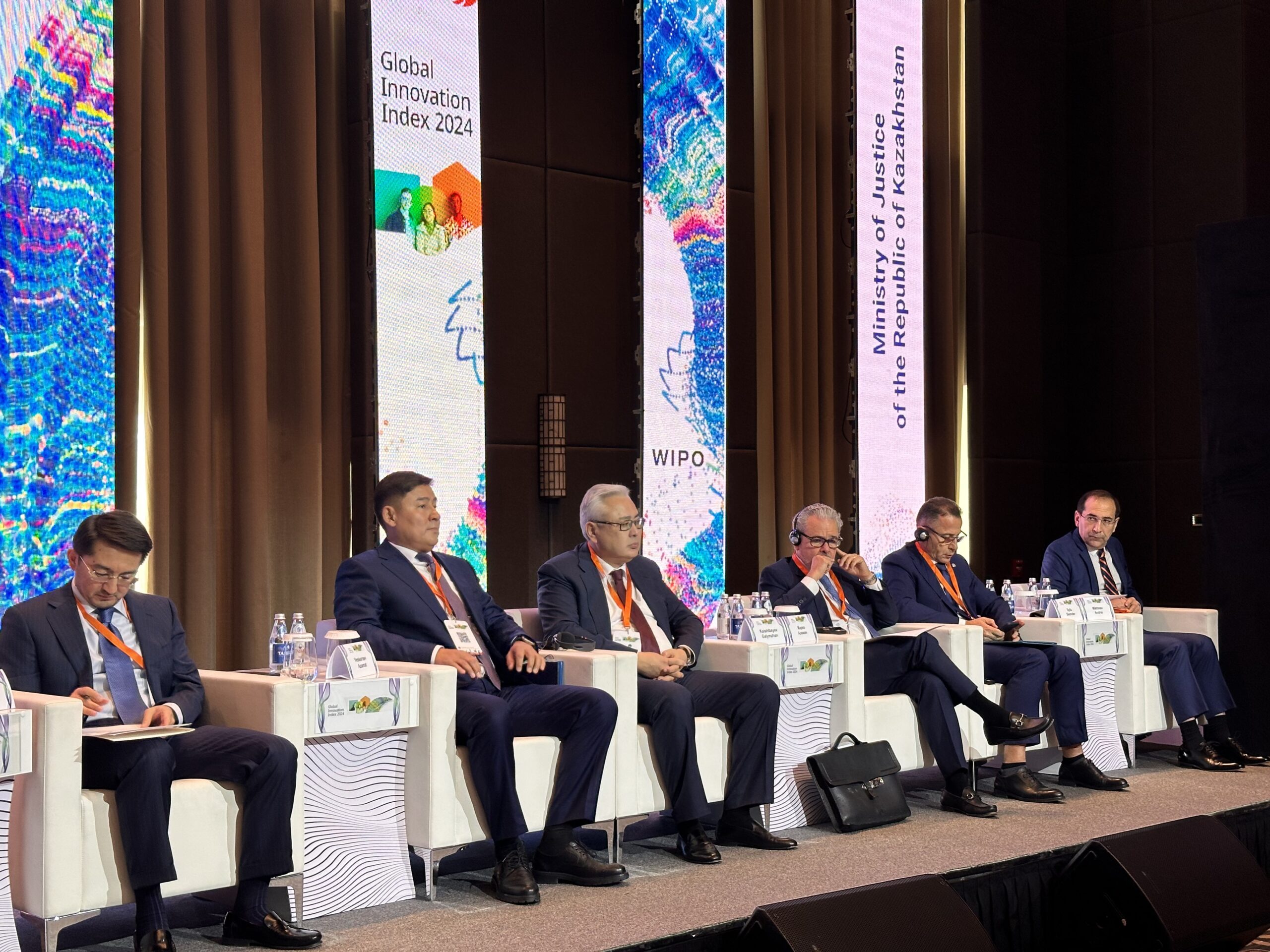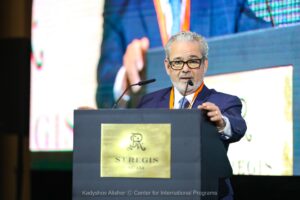Kazakhstan Hosts First Regional Presentation of Global Innovation Index, Highlights Region’s Innovation Potential

ASTANA – Kazakhstan hosted the first regional presentation of the Global Innovation Index (GII) 2024 results for Asian countries on Oct 1, highlighting the Central Asian region’s potential in innovation and high-tech development.

Kazakhstan hosted the first regional presentation of the Global Innovation Index (GII) 2024 results for Asian countries. Photo credit: Nargiz Raimbekova/The Astana Times
The index, compiled by the World Intellectual Property Organization (WIPO), analyzes innovation activity in 133 economies around the world, assessing their strengths and weaknesses.
This year, Kazakhstan rose in the ranking from the 81st to the 78th spot, entering the top three of Central and Southern Asian nations, according to the latest GII report revealed on Sept. 26 in Geneva.
Kazakh Minister of Justice Azamat Yeskaraev highlighted the progress Kazakhstan made in the ranking, noting that it drives the country’s economic growth and development across various sectors and creates favorable conditions for business and innovations.
“Improvements were felt in areas such as government effectiveness, the rule of law, PISA [Programme for International Student Assessment] scores in reading, mathematics and science, market sophistication, ease of doing business and the net inflow of foreign direct investments,” he said.
“In recent years, Kazakhstan has seen an increase in the number of patent applications, both nationally and internationally. From 2019 to 2023, over 8,000 patents for inventions and utility models were granted. These figures reflect our commitment to stimulating the country’s intellectual activity,” added Yeskaraev.
Despite these positive results, there is still much work to be done, according to the minister.
“We place special emphasis on improving legislative work, including to support innovative activities. We have undertaken significant reforms in legislation aimed at protecting intellectual property, which align with international standards and the requirements of the WIPO and WTO. We hope that our efforts will help the Republic of Kazakhstan more effectively integrate into the global innovation landscape and strengthen its position in future editions of the Global Innovation Index,” said Yeskaraev.
Central Asia in the global context
The conference was attended by WIPO’s Assistant Director General in IP and Innovation Ecosystems Sector, Marco Aleman, who briefed the audience on the global innovation outlook and the Central Asian region’s standing in the innovation sphere.

Marco Aleman, WIPO’s Assistant Director General in IP and Innovation Ecosystems Sector, speaking at the conference. Photo credit: Kadyshev Alisher/ Center for International Programs
According to him, several middle income economies have demonstrated consistent rise and strong commitment to improving in all areas of the ranking.
“This group includes China, that still is the only middle income economy within the GII top 30 countries, but also Türkiye, India, Vietnam, Philippines, Indonesia, the Islamic Republic of Iran and Morocco. These economies show remarkable potential and resilience, and their progress is encouraging for all other middle income economies that are also transforming the innovation ecosystem,” said Aleman.
The Central Asian region is also showing promising results, which is a testament to its long-standing vision for innovation.
“The Central Asia region has been making notable strides in innovation driven by increasing investment in education, infrastructure and government-led initiative to diversify its economies. In 2024 three of the four economies from Central Asia featured in the GII rose in the ranking. Kazakhstan ranked now 78th – the top performing in the region, entered the top 80 list of the most performing in innovation economies. Kyrgyzstan now ranks 99th, and indeed, Kyrgyzstan made the biggest jump in the report of this year. While the Central Asia innovation ecosystem is still developing compared to other regions, the outward trend in innovation ranking signals the promising future,” said Aleman.
He cited some important data from the GII that demonstrate increased investment in research and development (R&D) and high-tech.
“Research and development expenditure has grown by about 60% in the last 20 years, from $700 million in 2002 to $1.2 billion in 2023 even though they remain at relatively low levels. High tech exports in the region have grown rapidly, effectively, by 50% in the past 10 years,” said Aleman.
“While Kazakhstan still accounts for most high tech exports in the region, almost 95%, Kyrgyzstan has also increased its value by a factor of five. And indeed a number of policies were shared that shows that this effort in promoting high tech export certainly is very high in the agenda. Moreover, intangible assets are also on the rise in the region. The value of brands from Central Asian countries more than doubled in the past five years, from over $600 million in 2019 to over $1.2 billion in 2024,” he added.
In a comment to The Astana Times, Aleman stated that the conference offered a valuable opportunity for collaboration between the government, businesses, and WIPO, allowing them to exchange ideas on innovation and transition from theory to practical action.
“We are really happy to be here and to organize such type of events outside Geneva, because it allows to have a direct contact with the different actors of the innovation ecosystem. (…) All those actors have their own perspective and interest and particularly have a role to play in improving the innovation ecosystem. For us, having this direct access has tremendous value,” he said.
“On the other hand, for the authorities, the possibility of exchanging about practical issues, like, for example, how they can collect better data in order to be reflected in the global indicator, like the Global Innovation Index, and at the same time, how they can update data and how they can interpret that data for the goal of improving policies in the country are good examples of what we can get from a meeting like this,” added Aleman.
Kazakhstan’s progress in shaping an innovative ecosystem
During the press briefing Sacha Wunsch-Vincent, head of Section, Economics and Statistics Division, and co-editor of the GII at the WIPO, highlighted the key steps Kazakhstan has taken in the right direction amid overall decline in global venture capital investment.
“Among the five Central Asian economies, Kazakhstan has made the biggest jumps in the region, and as was mentioned in the speeches this morning, the importance played by Central Asia, in particular Kazakhstan and also Uzbekistan, to innovation as a driver of innovation and economic growth, has been relatively spectacular,” said Wunsch-Vincent.
According to him, after a “golden age” of innovation with unseen levels of venture capital growth and R&D spending during and after the pandemic, the world now experiences significant declines in those sectors.
“We see significant declines of minus 10%, minus 40% of venture capital deal values and numbers, a decline in international patent filing and scientific publications, and to some extent, a slowdown in research and development expenditures, including from the top corporations,” said Wunsch-Vincent.
At the national level of Kazakhstan, there is a “mixed picture emerging,” he said.
“That is a decline of international patent filings by minus 8% and R&D investments by minus 5%, but in terms of venture capital, despite the global downturn, a significant progress of 75%. So while the global venture capital market is turning sour, the Kazakh one is still flourishing to a very significant extent,” said Wunsch-Vincent highlighting that it is one of the strongest venture capital growth in the world.
He highlighted significant progress made by Kazakhstan in digital transformation.
“I think you really have to acknowledge the strong money that is invested in the infrastructure. And this is not just the hard infrastructure, but it’s also the soft infrastructure, including the digital infrastructure. What we’ve seen yesterday by the Ministry of Digital Transition and Aerospace, what is happening in terms of e-government in Kazakhstan is probably – you’re not playing in the top 50 of the world, but this is more like top 10, top 15 of the world in terms of what is possible in terms of e-government and digital infrastructure,” said Wunsch-Vincent.
While Kazakhstan could increase its efforts in R&D expenditure, there are supportive mechanisms already in place that could help drive future growth in this area.
“The R&D expenditure level relative to GDP is not at the level as in the top 30 countries of the world, so we are still at a relatively low level of R&D to GDP ratio. But the examples that we heard yesterday on how Kazakhstan is trying to ramp up with obligations of corporate R&D expenditure, huge R&D tax credits [300%], is also something that we believe at WIPO will drive a strong R&D expenditure increase in the near future,” said Wunsch-Vincent.
He also commended Kazakhstan’s strong performance in human capital.
“What we’ve seen yesterday in terms of the coding skills, the software coding skills, but also your efforts, in particular in artificial intelligence, and also the green transition, is something that is much more significant than I’ve seen in other countries,” he said.





